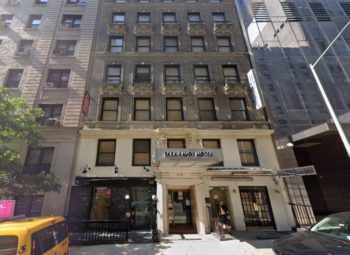
158 West 58th Street. Image Credit: Google Maps.
City approved homeless shelter for single men in former single-room-occupancy building on West 58th Street. As part of its “Turning the Tide on Homelessness” initiative, the City planned to operate a homeless shelter in a building at 158 West 58th Street, located on Manhattan’s “Billionaires’ Row.” The nine-story building was constructed in 1910. The building initially operated as single-room occupancy housing and later as the Park Savoy Hotel. The building’s new owner, New Hampton, LLC, partnered with the non-profit organization Westhab, Inc. to convert the building to a homeless shelter for 150 employed or job-seeking men.
The West 58th St. Coalition, opposing the shelter, filed an article 78 petition, alleging that Buildings’ Group R-2 classification of the building was improper because the shelter is transient in nature. The R-2 classification permitted continued use of the historic building without modification of the residential spaces to comply with current Building Code. The Coalition also alleged that the building violated general safety and public welfare standards because the building had a single, stairway exit that did not lead directly to the street.
Buildings justified its classification of the building as R-2 occupancy on the building’s prior classification, Group J-2, which Buildings deemed the equivalent of current R-2. Buildings also cited evidence that residents of shelters with similar services occupy their units on average for at least thirty consecutive days, fulfilling the R-2 “permanent resident purposes” requirement.
Supreme Court Justice Alexander Tisch upheld Buildings’ classification and dismissed the Coalition’s petition. Judge Tisch found that the R-2 occupancy determination was rational and based on evidence. Judge Tisch rejected the Coalition’s claim that the building was unsafe, citing the Temporary Certificate of Occupancy which was conditioned on the hiring of two fire guards and the installation of additional sprinklers, and on the Fire Department’s lack of objection to the building’s fire safety plan. The Coalition appealed.
The Appellate Division, First Department, affirmed Judge Tisch’s rulings, upholding the classification, but remitted the case to the Supreme Court for additional hearings on general safety and public welfare. The City appealed the order for additional hearing.
The Court of Appeals agreed with the City and ruled that the Appellate Division erred in remitting the matter for additional hearings on general safety and public welfare. Once a court ruled that Buildings’ classification was legal and rational, the court was without authority to order the agency to receive additional evidence that was not available to the agency at the time of its determination.
58th St. Coalition v. City of New York, 37 N.Y.3d 949 (2021).
By: Emily Sforza (Emily is a New York Law School student, Class of 2023.)


This high-handed approach is a bad way to do things.
Instead, every neighborhood should be given a choice to have a shelter or to pay for it to be somewhere else, which they would pay for directly.
The loss of property values/tax revenue will be greater than the amount spent on the shelter and/or saved by reusing the hotel there. There’s also opportunity cost by not using that valuable land for people who can pay for the location.